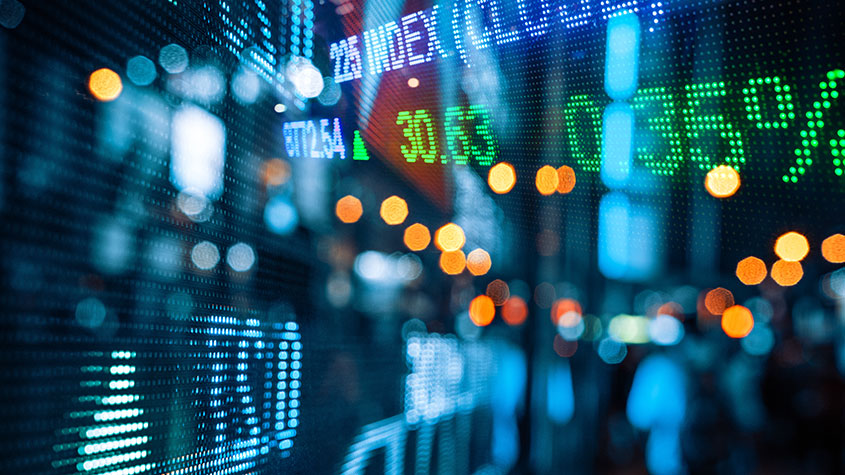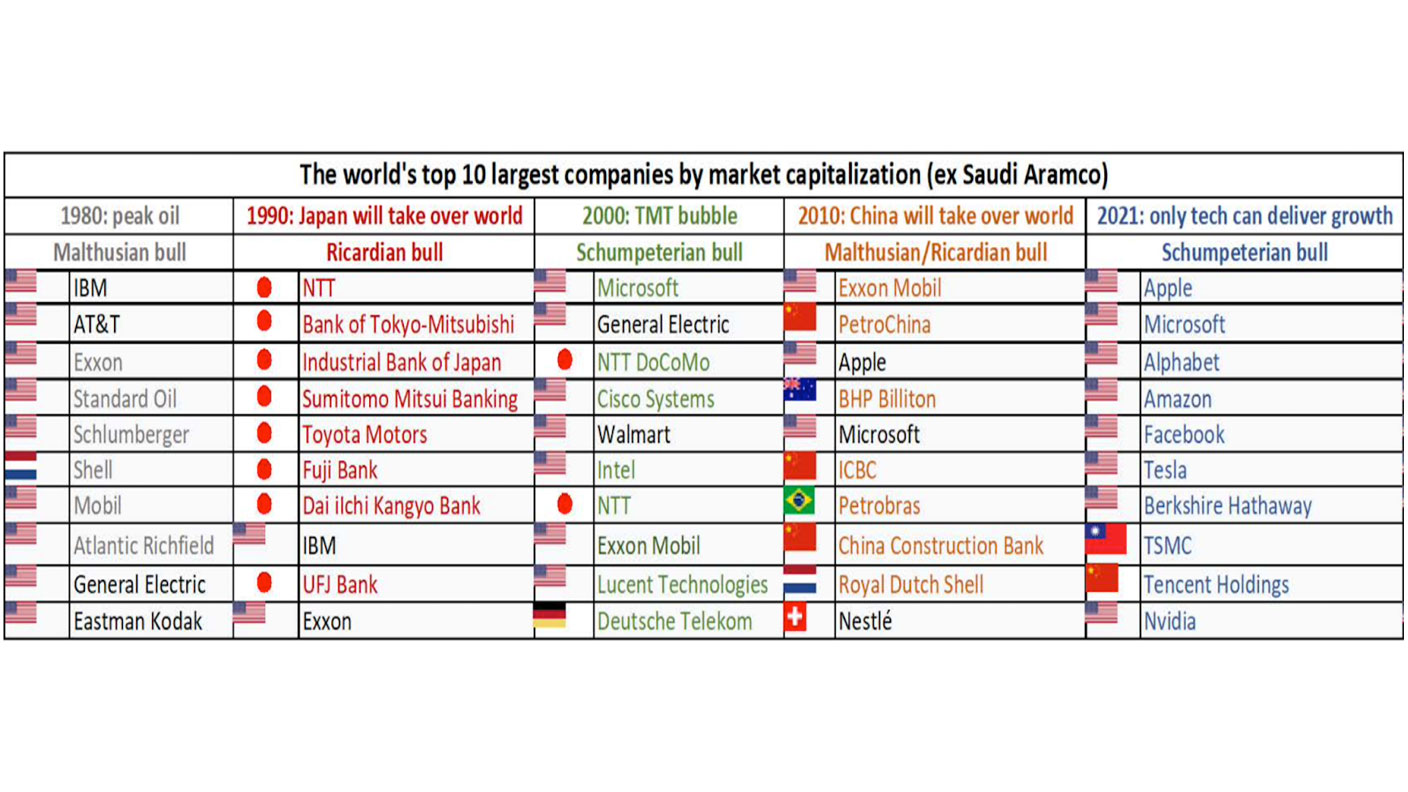What does the next decade have in store for investors?
Investors face a “sea change” in the investment environment. Dominic Frisby explains what this could mean for your money.


Get the latest financial news, insights and expert analysis from our award-winning MoneyWeek team, to help you understand what really matters when it comes to your finances.
You are now subscribed
Your newsletter sign-up was successful
Want to add more newsletters?

Twice daily
MoneyWeek
Get the latest financial news, insights and expert analysis from our award-winning MoneyWeek team, to help you understand what really matters when it comes to your finances.

Four times a week
Look After My Bills
Sign up to our free money-saving newsletter, filled with the latest news and expert advice to help you find the best tips and deals for managing your bills. Start saving today!
I stumbled across a Gavekal Research Daily Comment over the weekend with a really interesting table that I thought we could discuss today.
Gavekal Research, if you don’t know it, is a financial research firm that provides analysis and insights on global economies, markets and industries. It was founded in 1999 by Charles Gave, Anatole Kaletsky, and Louis-Vincent Gave, and is headquartered in Hong Kong.
It is, the internet tells me, known for its holistic approach to analysis. Holistic is one of those corporate buzzwords that I never really knew what it meant.
MoneyWeek
Subscribe to MoneyWeek today and get your first six magazine issues absolutely FREE

Sign up to Money Morning
Don't miss the latest investment and personal finances news, market analysis, plus money-saving tips with our free twice-daily newsletter
Don't miss the latest investment and personal finances news, market analysis, plus money-saving tips with our free twice-daily newsletter
Again the internet is our friend: in the context of financial analysis, holistic analysis refers to considering a wide range of factors, such as economic, political, and behavioural, in order to gain a full understanding of market developments.
It is a way of looking at the big picture rather than just focusing on specific details or individual factors.
Why didn’t they just say “big picture”? Such is the equivocal financial world in which we live.
In any case, Louis-Vincent’s report is a compelling one.
He describes how, roughly every decade or so, financial markets fall in love with a new narrative. This is something we have observed many times in this column. The 1970s were all about precious metals and energy. The 1980s went to Japan. The 1990s saw tech stocks take over and the 2000s were all about natural resources and extraordinary growth in China. The 2010s were all about tech.
So what about the 2020s – what are they all about?
What does the next decade have in store for investors?
Gave suggests that there will be one of three core ideas to each narrative “The opening of new markets to capitalism (Ricardian growth), technological breakthroughs (Schumpeterian growth), or the fear that in the coming years there will not be enough for everyone (the Malthusian constraint).”
Each time the narrative is persuasive and rooted in some truth, which is why it takes hold, but by the end of the cycle, valuations reach such extremes that they no longer make sense, a bear market sets in and a new narrative takes over.
Asset allocation is everything. All you have to do is shift from narrative to narrative. A lot easier said than done of course.
But here is Gave’s humdinger of a table.

You can see how clearly the narrative has shifted with each decade. By the end of the 1970s six of the world’s largest ten companies were oil companies. By the end of the next decade, just one of them was.
By the end of the 1980s, eight of the world’s largest ten companies were Japanese. By the end of the following decade, just two of them were.
At the turn of the century, seven of the world’s largest ten companies were tech related. By the end of the following decade, just two were.
At the end of the noughties, seven of the world’s largest companies were natural resource companies. By the end of the following decade, not one was.
2022 seems to have marked the turning point. The Covid rallies in tech were the final spike in an amazing bull market.
These are all huge companies that make the foundation on which portfolios are built. But how many of 2021’s top ten will be there in ten years' time? Not more than two or three I wouldn’t have thought.
You have to hand it to Microsoft. It’s been there three decades running. Perhaps that’s because, in a way, as much as it is a tech stock it is also a patent holding company. Apple has also made that list twice.
So mighty are these companies and so entrenched in their monopolies, it is very hard to envisage them not being so mighty in ten years' time. But this is the world of tech. New inventions can come along that quickly make old monopolies redundant.
In that regard, I’ve just been playing with a new Open AI chat bot that my son, who is at university in Bristol, put me on to and it’s extraordinary. It can write essays. It wrote a blog that I am now going to use on my site – and it’s a better blog than I’ve ever had.
What the impact of it might be on, say, Google, who knows?
The investment landscape has changed for good
Gave says waiting for the Fed to cut rates and being long the likes of Nvidia or Alphabet makes “about as much sense as sitting in Tokyo in 1992 waiting for the Bank of Japan to cut rates in order to buy Industrial Bank of Japan.”
In short, we are in a transitioning phase. What does the next decade have in store for us?
Elsewhere, Howard Marks of Oaktree Capital also argues that we are in a “sea change” – only the third we have seen in his career. The model of success for the previous cycle is not going to work this time around. He suggests that the high leverage, asset owning, low-interest rate, low yield, low inflation models of the last cycle are behind us. The general landscape is much less optimistic.
He suggests that stimulative rates are not coming anytime soon and that the base rate will remain in the 2%-4% range. We are now in a full-return world, not a low-return world, and investors can get good returns from credit yield instruments – high-yielding bonds and so on.
What worked before will not work now. What works now might be something that hasn’t worked for a long time.
Commodities could be winners
Gave, meanwhile, suggests emerging markets and commodities. Even with a China slowdown/lockdown, the Fed tightening and a surging US dollar, the S&P Goldman Sachs Commodities Index (S&P GCSI) has still returned 27%.
This will be an even better story when these forces reverse – when China opens up, the Fed stops tightening and the US dollar rolls over.
The GSCI has returned 27%, mostly on the back of energy. Metals have been a rather different story. But with those three reversals in place – weak dollar, no more tightening and China open – the stage is set for metals.
What do you think the next decade’s narrative is going to be? It’s there percolating somewhere. Malthusian, Ricardian or Schumpterian?
Get the latest financial news, insights and expert analysis from our award-winning MoneyWeek team, to help you understand what really matters when it comes to your finances.

-
 Should you buy an active ETF?
Should you buy an active ETF?ETFs are often mischaracterised as passive products, but they can be a convenient way to add active management to your portfolio
-
 Power up your pension before 5 April – easy ways to save before the tax year end
Power up your pension before 5 April – easy ways to save before the tax year endWith the end of the tax year looming, pension savers currently have a window to review and maximise what’s going into their retirement funds – we look at how
-
 Halifax: House price slump continues as prices slide for the sixth consecutive month
Halifax: House price slump continues as prices slide for the sixth consecutive monthUK house prices fell again in September as buyers returned, but the slowdown was not as fast as anticipated, latest Halifax data shows. Where are house prices falling the most?
-
 Rents hit a record high - but is the opportunity for buy-to-let investors still strong?
Rents hit a record high - but is the opportunity for buy-to-let investors still strong?UK rent prices have hit a record high with the average hitting over £1,200 a month says Rightmove. Are there still opportunities in buy-to-let?
-
 Pension savers turn to gold investments
Pension savers turn to gold investmentsInvestors are racing to buy gold to protect their pensions from a stock market correction and high inflation, experts say
-
 Where to find the best returns from student accommodation
Where to find the best returns from student accommodationStudent accommodation can be a lucrative investment if you know where to look.
-
 The world’s best bargain stocks
The world’s best bargain stocksSearching for bargain stocks with Alec Cutler of the Orbis Global Balanced Fund, who tells Andrew Van Sickle which sectors are being overlooked.
-
 Revealed: the cheapest cities to own a home in Britain
Revealed: the cheapest cities to own a home in BritainNew research reveals the cheapest cities to own a home, taking account of mortgage payments, utility bills and council tax
-
 UK recession: How to protect your portfolio
UK recession: How to protect your portfolioAs the UK recession is confirmed, we look at ways to protect your wealth.
-
 Buy-to-let returns fall 59% amid higher mortgage rates
Buy-to-let returns fall 59% amid higher mortgage ratesBuy-to-let returns are slumping as the cost of borrowing spirals.